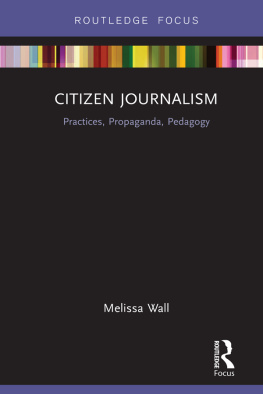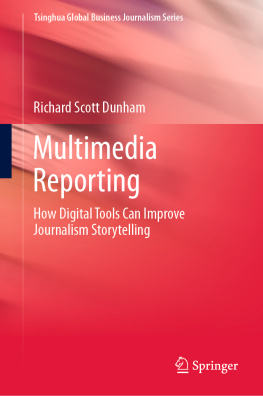
Digital Media and Reporting Conflict
Digital Media and Reporting Conflict explores the impact of new forms of online reporting on the British Broadcasting Corporations (BBC) coverage of war and terrorism. It is based on unique access to the BBC from 2007 to 2011 and reflects the views of more than 100 BBC staff at all levels of the Corporation. It argues that the BBCs practices and values are fundamentally shifting in response to the challenges of immediate digital publication. The contributions of the former audience, a more personal style and the presentation of news as process complement and test the BBCs impartial and objective approach to covering war and terrorism. The book demonstrates that the future of journalism will be dependent on the uneasy truce which is brokered between traditional media organisations and the collective intelligence of a networked society.
Daniel Bennett is an independent scholar and author of the blogs Mediating Conflict and Reporting War (The Frontline Club).
Routledge Research in Journalism
1 Journalists, Sources, and Credibility
New Perspectives
Bob Franklin and Matt Carlson
2 Journalism Education, Training and Employment
Bob Franklin and Donica Mensing
3 Network Journalism
Journalistic Practice in Interactive Spheres
Ansgard Heinrich
4 International News in the Digital Age
East-West Perceptions of a New World Order
Judith Clarke and Michael Bromley
5 How Media Inform Democracy
A Comparative Approach
Toril Aalberg and James Curran
6 Digital Media and Reporting Conflict
Blogging and the BBCs Coverage of War and Terrorism
Daniel Bennett
Digital Media and Reporting Conflict
Blogging and the BBCs Coverage of War and Terrorism
Daniel Bennett
First published 2013
by Routledge
711 Third Avenue, New York, NY 10017
Simultaneously published in the UK
by Routledge
2 Park Square, Milton Park, Abingdon, Oxon OX14 4RN
Routledge is an imprint of the Taylor & Francis Group, an informa business
2013 Taylor & Francis
The right of Daniel Bennett to be identified as author of this work has been asserted by him in accordance with sections 77 and 78 of the Copyright, Designs and Patents Act 1988.
All rights reserved. No part of this book may be reprinted or reproduced or utilised in any form or by any electronic, mechanical, or other means, now known or hereafter invented, including photocopying and recording, or in any information storage or retrieval system, without permission in writing from the publishers.
Trademark Notice: Product or corporate names may be trademarks or registered trademarks, and are used only for identification and explanation without intent to infringe.
Library of Congress Cataloging in Publication Data
Bennett, Daniel.
Digital media and reporting conflict : blogging and the BBCs coverage of war and terrorism / by Daniel Bennett.
pages cm. (Routledge research in journalism)
Includes bibliographical references and index.
1. WarPress coverageGreat BritainHistory21st century. 2. TerrorismPress coverageGreat BritainHistory21st century. 3. Online journalismGreat BritainHistory21st century. 4. JournalismObjectivityGreat Britain. 5. BlogsPolitical aspectsGreat Britain. 6. BlogsSocial aspectsGreat Britain. 7. British
Broadcasting Corporation. I. Title.
PN4784.W37B45 2013
070.43330941dc23
2012046677
ISBN: 978-0-415-81921-3 (hbk)
ISBN: 978-0-203-57647-2 (ebk)
Typeset in Sabon by
Apex CoVantage, LLC
For Kip and Jane
In loving memory of Don and Iris
Contents
2729 November 2008: Links to webpages in BBC live updates
27 November 2008: Sources cited in BBC live updates
28 November 2008: Sources cited in BBC live updates
29 November 2008: Sources cited in BBC live updates
2729 November 2008: Sources cited in BBC live updates
2729 November 2008: Digital sources cited in BBC live updates
2729 November 2008: Official, nonofficial and media sources cited in BBC live updates
It is perhaps fitting that a book chronicling the emergence of a more collaborative form of journalism was the result of a truly collaborative project.
I would like to thank the Arts and Humanities Research Council for funding the project and all of the BBC participants who gave up their time to contribute to the book. I would particularly like to mention Peter Burdin, David Hayward and Jonathan Baker for their support at the BBC.
I am very grateful to my PhD supervisor at the War Studies Department, Dr Peter Busch. The project was his idea and his vision for the book provided me with an excellent framework. He was always generous with his time and it has been a pleasure to work with him. The critique supplied by my PhD examiners, Professor Stuart Allan and Professor Howard Tumber, improved the theoretical grounding of the books final text.
I have benefited from the oversight of an excellent editor in Felisa Salvago-Keyes at Routledge. I would also like to thank Dominique Jackson for her editorial advice on an initial full draft and Malcolm Balen for reading the book on behalf of the BBC. Martin Belam, Alexandra Eriksson, Stuart Hughes, Chris Vallance and Marie Kinsey kindly read drafts of chapters and provided me with insightful feedback and criticism.
I am grateful to Graham Holliday for offering me the opportunity to blog for the Frontline Club and during the project I have been influenced, encouraged and challenged by bloggers and Twitter users from all over the world. They are too numerous to mention here, but together they formed a virtual office of ideas and information.
Finally, there were a number of people who have shared the journey while I have been writing this book. Their love and support made it possible, and I owe them a great debt of gratitude. I am particularly thankful to my family: Kip, Jane and Owen Bennett and my housemates: Nic Mogford, Dave Jones, and Tom Hill.
I would also like to mention a few of the people whose friendship has been invaluable to me: Carl and Alice Brown, Tom and Marian Carson, Megan Collett, Laura Davies, Jamie Dunn, Alexandra Eriksson, Marco Evans, Alexander Hargreaves, Sarah Hewerdine, Alexandra Johnson, Esther Lloyd, Joe and Sarah-Jane Marshall, Ellie and Luke McLaughlin, Judy Mead, Jeni Mitchell, Kieran Mitton, Maria OReilly, Fiona Paterson, Adam and Hannah Stacey, Judith Townend, Lineu and Susan Vargas and Stu and Sian White.
The Impact of Blogging on the BBCs Coverage of War and Terrorism
had been doing some translation work for the newspaper.
By September, John Naughton of The Observer noted that Salam Pax had gone mainstreama reference to Salams appearances in The Guardian and on the BBC.
Salam Paxs blog presented BBC journalists with new challenges based on old editorial concerns, but it also provided a way of accessing a compelling voice which might never have been heard without the communication possibilities afforded by the World Wide Web. It is an example of how the context of conflict has proved to be a catalyst for new blogs and the use of blogs by journalists. Blogs offered a straightforward publishing outlet for people who wanted to express their views on events which fundamentally affected their lives. In turn, journalists began to realise the potential of blogs and other digital media to complement their coverage of war and terror.







